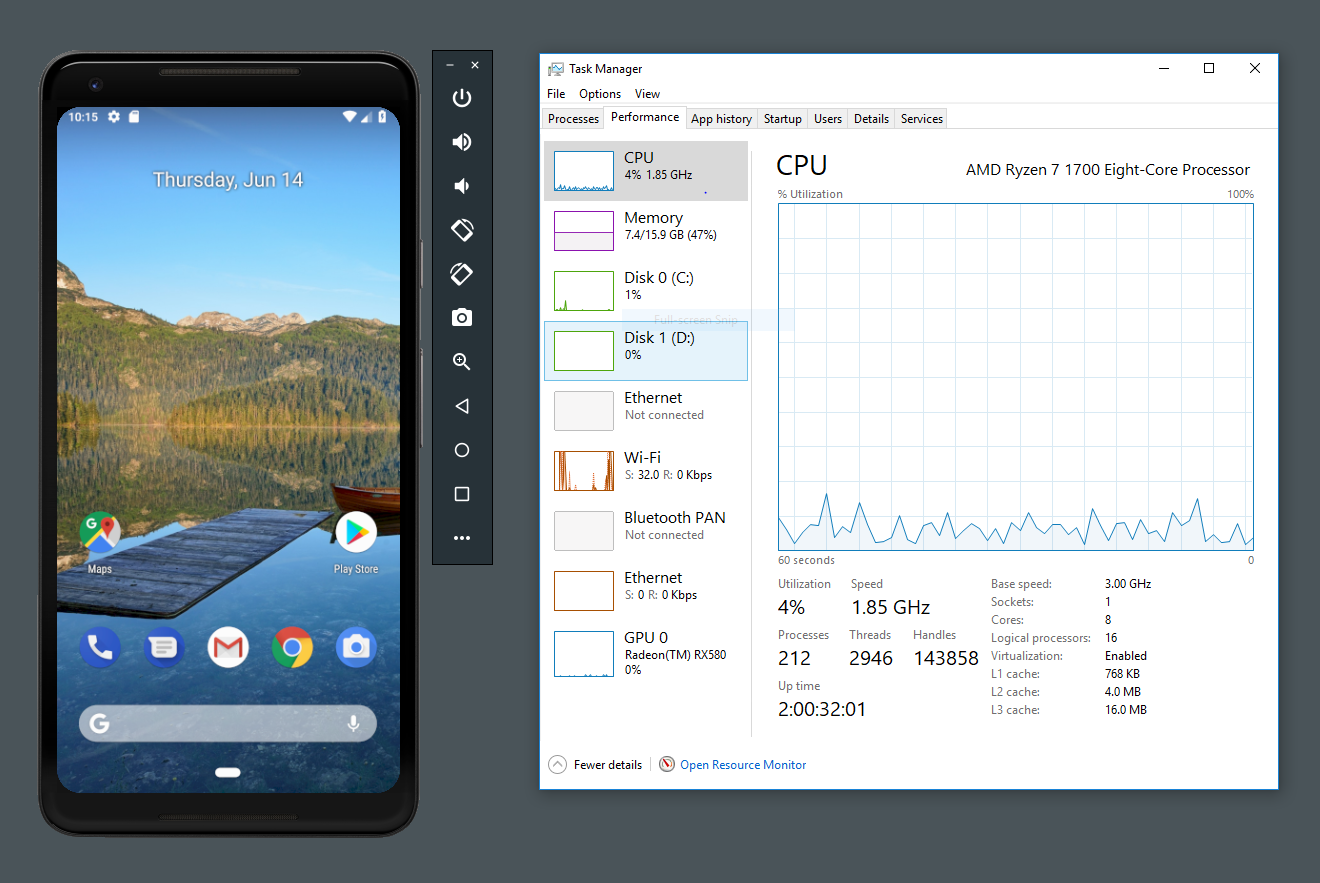Android emulator linux is a software that allows users to create and run Android apps on their Linux computers. It is based on the open-source Android SDK and uses the QEMU virtual machine to emulate the Android platform. The emulator supports both ARM and x86 architectures, and can be used to develop and test Android apps on a variety of devices, including smartphones, tablets, and wearables.

Is There A Android Emulator For Linux?
Yes, there is an Android emulator for Linux. Genymotion is one of the dominating industry players in the scope of Android emulators for Linux. This emulator comes along with cloud support. Genymotion finds its compatibility with Android Studio and Android SDK tools.
Can Bluestacks Run On Linux?
Yes, Bluestacks can run on Linux, but it requires some tweaking. The best way to run Bluestacks on Linux is to use an emulation layer like Genymotion.
Does NOX Work On Linux?
No, Nox App Player is not available for Linux. However, thre are some alternatives that run on Linux with similar functionality. The best Linux alternative is Android-x86, which is both free and Open Source.
Can You Install APK On Linux?
Yes, you can install APK files on Linux using the Anbox application. Anbox is a free and open-source Android app player that allows you to run Android apps on your Linux device. To install Anbox, first confirm that your Linux distribution supports snap packages. Then, install or update the snapd service. Once snapd is installed, you can install Anbox from the Snap store.
Can You Play Android Games On Linux?
Yes, you can play Android games on Linux using the Anbox platform. Anbox is a version of Android that runs in a container, allowing you to run Android applications in an integrated manner with your operating system just like a native Linux application. This makes it possible to play Android games on Linux withot any issues.
Do Emulators Work On Linux?
Yes, emulators work on Linux. Emulators are software programs that allow users to play games that were originally intended for hardware like the Gameboy, arcade games, Atari, and many others. The emulators are relatively easy to setup as readers will see. NOTE: In this article, “apt-get” is used to installed many of thse emulators.
How Do I Install Emulators In Linux?
First, you need to install an Android emulator. There are many Android emulators available, but we recommend using Genymotion.
Once you have installed Genymotion, you can follow thse steps to install an Android emulator in Linux:
1. Launch Genymotion and create a new virtual device.
2. Select the desired Android version and device model for your virtual device.
3. Follow the on-screen instructions to complete the configuration of your virtual device.
4. Once your virtual device is up and running, you can start usng it to install and test Android apps.
Is GameLoop Available For Linux?
Yes, GameLoop is available for Linux. You can download it from the GameLoop library or search results.
How Install Nox In Linux?
Nox can be installed on Linux by using the apt package manager. First, update the apt database:
sudo apt-get update
Then, install Nox using apt-get:
sudo apt-get install nox
Finally, launch Nox:
nox
How Do I Download Bluestacks On Linux?
The best way to install Bluestacks on Linux is to use a virtual machine. VirtualBox, KVM, and other virtualization software can be used to create a virtual machine on which Windows 10 can be installed. Bluestacks can then be installed on Windows and used to run Android applications.
What Is NOX In Python?
Nox is a command-line tool that automates testing in multiple Python environments. It is similar to tox in that it can be used to run tests in multiple Python environments, but it uses a standard Python file for configuration. This makes it easier to use and more flexible than tox.
Can Zorin OS Run Android Apps?
Yes, Zorin OS can run Android apps. You need to install the Zorin Connect Android app from the Google Play Store in order to do so.
Can I Install Android App On Ubuntu?
Yes, you can install Android apps on Ubuntu using the Anbox runtime. Anbox provides a seamless way to run Android apps on Ubuntu without any emulation layer.
Can I Install Android In Virtualbox?
Yes, you can install Android in VirtualBox. You will need to obtain the Android ISO, and then use the VirtualBox interface to create a new VM. Once the VM is created, you can boot from the ISO and follow the prompts to install Android.
How Do You Install Google Play On Linux?
Google Play Store can be installed on Linux using the Anbox application. First, install Anbox and the required dependencies. Next, use the install-playstore.sh script to install Google Play Store.
What Is APK In Linux?
APK is a package manager for Alpine Linux systems. With APK, users can install, upgrade, or delete software packages on thir system with ease. All software packages for Alpine Linux are digitally signed to avoid security problems.
Is There A Linux Phone?
Yes, thre are Linux phones. A few examples are eSolutions with an operating system called /e/OS, Purism using PureOS, Volla with Ubuntu Touch, and Pine64 with a mobile edition of Manjaro Linux.
Is Android X86 An Emulator?
No, Android x86 is not an emulator. Emulators are typically used to run one operating system on another, whereas Android x86 is designed to be installed and run on a PC.
How Do I Download Android Emulator On Linux?
The process for downloading and installing the Android emulator on Linux is similar to that on other platforms. First, download the Android SDK from the Android website. Next, unzip the SDK to a directory of your choice. Then, open a terminal window and navigate to the SDK directory. Finally, run the following command to install the Android emulator:
./tools/android create avd –name –target –abi
Where is the name you want to give your virtual device, is the ID of the target platform you want to run on the emulator, and is the CPU architecture you want to use.
Can You Run Emulators On Ubuntu?
Yes, you can run emulators on Ubuntu. The most popular emulator is the Windows Emulator, whih allows you to play Windows-based games on your Ubuntu computer. You can also use a compatibility layer, such as Wine, to run Windows programs on your Ubuntu computer.
What Is The Best Linux Distro For Gaming?
There are a few different Linux distributions that are great for gaming. One of the best is Drauger OS, which is designed specifically for gaming. It includes a custom desktop environment and a wide range of pre-installed games. Another great option is Ubuntu GamePack, which provides access to hundreds of games through its repositories. Lastly, Fedora Games spin is a great choice for open source gaming, as it includes a large number of popular games that are available under open source licenses.
How Do I Run An Emulator On Linux?
You can run an emulator on Linux by using the command line. To do this, you will need to first build and package your app into an APK. You can then install your app using adb and run it on the emulator.
Can We Install Android Emulator Without Android Studio?
First, we need to set JAVA_HOME environment variable. Then, we can launch the Android emulator withut installing Android Studio.
Can We Use Emulator Without Android Studio?
Yes, you can use the Android Emulator wthout Android Studio. To do so, you’ll need to download and install the Android SDK tools from the Android website. Once you have the SDK tools installed, launch the “android” tool from the tools directory. From there, you can select the “SDK Platform” for each version of Android that you’d like to use in your emulator.
How Can I Use Android Studio In Ubuntu?
Android Studio is the official integrated development environment (IDE) for Google’s Android operating system, built on JetBrains’ IntelliJ IDEA software and designed specifically for Android development. It is availble for download on Windows, macOS and Linux from the Android Studio website.
Once you have downloaded and extracted the ZIP file, launch the android-studio/bin/studio.sh script to open Android Studio. If you’re using a 64-bit version of Ubuntu, you’ll need to install some additional 32-bit libraries with the following command:
sudo apt install libc6:i386 libncurses5:i386 libstdc++6:i386 lib32z1 libbz2-1.0:i386
Once these libraries are installed, you should be able to launch Android Studio without any issues.
How Do I Download Android SDK On Ubuntu?
To download the Android SDK on Ubuntu, first you need to install the Java Development Kit (JDK). You can do this by running the fllowing command:
sudo apt-get install openjdk-7-jdk
Once the JDK is installed, you can download the Android SDK from the Android Developer website. After downloading the SDK, unzip it to a directory of your choice.
export ANDROID_HOME=/path/to/android-sdk
In order to use the SDK, you will need to add its tools directory to your PATH. You can do this by running the folowing command:
export PATH=$PATH:$ANDROID_HOME/tools
Now you should be able to run the android command from your terminal.
Is There A Virtual Machine For Android?
Yes, there is a virtual machine for Android called VMOS. VMOS is an app that allows users to run another Android OS as a guest operating system on their Android device. The VMOS guest Android operating system has access to the Google Play Store and other Google apps.
What Is The Best Virtual Machine For Android?
There are a few different ways to answer this question, as there is no one-size-fits-all answer. The best virtual machine for Android depends on your needs and preferences. Some of the most popular options include Workspace ONE, CAMS, TruGrid, FastDesk, Incredibuild, Microsoft Azure, and Iperius Backup. Each of these has its own strengths and weaknesses, so you’ll need to evaluate each one to see which is the best fit for you.








